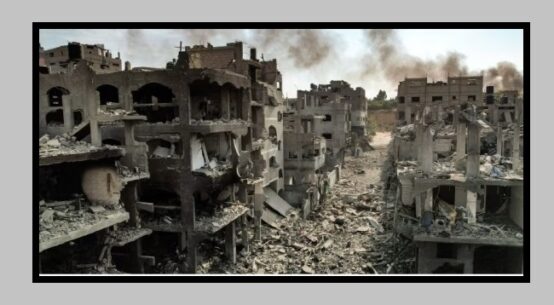
On 25th July, the Israel parliament Knesset passed a controversial law to clip the wings of the “interventionist” Supreme Court, the mainstream newspaper published a full “black” front page with a small white print at the bottom: “A Black Day for Israeli Democracy”.
Immediately, the Ethiopian Jews and residents of Israel protested the front-page all-black Israeli newspaper as an insult to their ancestors from black Africans. The Ethiopian activist says Israeli society must stop using the word ‘black’ as a derogatory and racist vocabulary.
The lawmakers passed a controversial judicial overhaul law to “Cancel the Reasonableness Standard”. The law revokes the Supreme Court’s authority to overturn government decisions it deems unreasonable.
The opposition en masse boycotted the vote, and the final tally was 64-0. Apparently, every member of the coalition voted in favour of the bill.
Despite the opposition boycott, tens of thousands in street protests and other threats Israeli Prime Minister Benjamin Netanyahu remains unfazed by the clear and present threat to Israel’s security.
Opponents of the reforms argue that they (governing conservative Jewish alliance) will undermine Israeli democracy and risk introducing majoritarian rule.
Netanyahu’s allies claim that in recent decades the Supreme Court has been overly interventionist and that its powers should be curbed.
Opposition politicians accused long-serving Prime Minister Netanyahu of pushing Israel towards autocracy, while Netanyahu says his ‘Reforms’ strengthen Israel’s democracy.
When Netanyahu and his allies declare their judicial overhaul ‘makes Israel democratic again,’ they are fighting both fact and logic.
Under Israeli law, “reasonableness” refers to a balance between political and public interests in decision-making. An “unreasonable” decision is one that “disproportionately focuses on political interests without sufficient consideration for public trust and its protection.”
Several organisations, as well as private individuals, have filed petitions against the repressive law since its passing. They include the Bar Association, the Movement for Quality Government in Israel, and former lawmakers, army officers and social activists.
The bill to abolish the reasonableness standard, which ends the High Court’s authority to strike down government decisions that it deems unreasonable, passed the third and final Knesset vote needed to ratify it into law.
On 26 July, Israel’s High Court refrained from freezing the new law cancelling the reasonableness standard, setting a September date to hear the petitions against the contentious law.
The doctrine of reasonableness originates from English law and has been applied by the Supreme Court in Israel over the years. It served to protect individuals from government infringement on their fundamental rights and to invalidate extreme and unreasonable appointments.
At the end of June, Netanyahu told the Wall Street Journal that he would seek to revise the Judicial Selection Committee. This is supported by the coalition’s decision not to advance the old legislation.
Under the newly approved law, the Supreme Court is no longer allowed to invalidate any government decision, including those made by the Prime Minister, Ministers, or Knesset members, such as appointments or dismissals.
The Judicial Selection Committee is perhaps the most contentious issue of judicial reform, a matter where experts, NGOs and negotiating parties have said were unable to even approach consensus.
Critics of the current system believe that the panel for appointing judges is not accountable enough to voters and that the Israel Bar Association and judiciary representatives on the panel form a self-interested majority block that in essence allows judges to self-select their replacements and promotions.
Hours after the passage tens of thousands of protesters took to the streets across the country in the evening, what is known as the “reasonableness standard”.
On the other hand, Israel’s adversaries Iran, Lebanon, Hezbollah and Hamas found an opportunity in its judicial crisis.
The crisis sweeping Israel has become a focal point for its enemies across the Middle East who have convened top-level meetings to weigh the turmoil and how they might capitalise on it, sources familiar with the discussions say.
Foes including Iran-backed Hezbollah have been crowing at the sight of Israel fractured by the crisis ignited by government moves to overhaul the judiciary, especially threats by reservists to stop showing up for military service as an opportunity.
With a grin on the face of Hezbollah leader Sayyed Hassan Nasrallah, in a speech on 24th July, said Israel was on a “path of collapse and fragmentation.”
The upheaval marks one of the most serious domestic crises since Israel was established in 1948, ushering in decades of conflict with Arab countries and Palestinians who want to establish a state in territory occupied by Israel, reported Reuters news agency.
Yet at the prime time news hour after the vote, Prime Minister Netanyahu faced the nation and said, “This is not the end of democracy – it’s the fulfilment of democracy.”
Saleem Samad, is an award-winning independent journalist, media rights defender, a recipient of the Ashoka Fellowship and Hellman-Hammett Award. He could be reached at <saleemsamad@hotmail.com>; Twitter @saleemsamad


